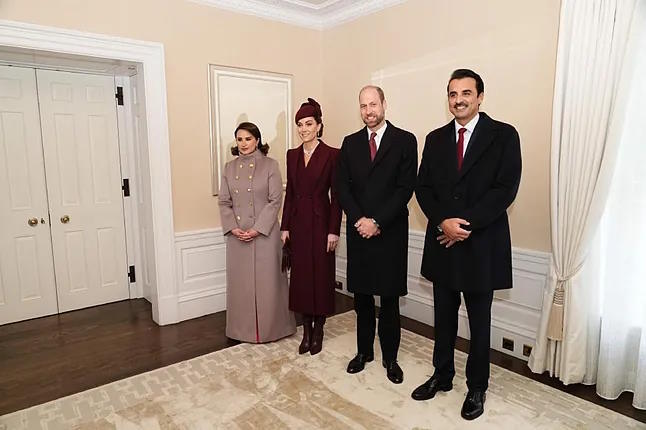During the seven-decade-long reign of the methodical Isabel II, Her Gracious Majesty almost made it a custom to host two State visits each year, usually one in each semester. The extraordinary pomp displayed by the Windsors at these events, the meticulous design of the agenda and bilateral agreements, and the desire to give the highest possible prominence to visits of higher rank in international protocol turned into a true tradition in London the frequent occurrence of these types of visits where heads of State of allied countries are received with the highest honors.
Charles III has been on the throne for less than three years, but seems determined to follow in his mother's footsteps on this matter. The cancer diagnosed at the beginning of 2024 forced him to minimize his agenda to the maximum for several months. And, as if wanting to make up for lost time, he has recently accelerated his role as a statesman. Thus, at the end of June, he rolled out the red carpet to welcome the Emperors of Japan; in October, he embarked on his first major foreign tour with visits to Australia and Samoa - where he presided over the Commonwealth summit -; and this Tuesday he receives in the second annual State visit the Emir of Qatar, Tamim bin Hamad Al Thani.
The sovereign of the small but wealthy Petrostate, who arrived in London on Monday with one of his three wives, Sheikha Jawaher, received a colorful welcome ceremony on Tuesday at noon, marking the official start of a visit with a strong economic focus. However, the ailing health of the members of the British royal family unfortunately once again takes center stage on this very important trip for the interests of the United Kingdom. Thus, while the good news is that the Princess of Wales, Kate Middleton, is back to attending some events in the program - though not the grand State banquet tonight -, on the other hand, Buckingham announced hours before the arrival of the Arab leader that Queen Camilla would not be present at the reception as, a month later, she is still not fully recovered from her chest infection.
The Emir of Qatar's visit is the first State visit of the era of the new Prime Minister, the Labour leader Keir Starmer, who, like all his predecessors, does not hide his intention to rely on the Windsors to boost business in the Gulf, especially when London is particularly in need of reducing its significant trade deficit by increasing its economic agreements with the wealthiest countries in the turbulent Middle East.
The Qatari Emir and his consort started the day at Kensington Palace, where Prince William and his wife hosted them with a private reception as a welcome to the country. Next, they all moved to Horse Guards Parade, where King Charles awaited them, who officially welcomed his guests, and where the two heads of State reviewed the troops. As is customary in the British Monarchy, there was the colorful carriage ride to Buckingham Palace, where members of both dynasties will have lunch, and later visit an exhibition at the same royal residence, which will close its doors for three years after this trip for extensive renovations.
Queen Camilla has been in poor health since her return from Australia and Samoa. Doctors have reportedly advised her to avoid outdoor events, so her meeting with the Emir of Qatar will take place in the palace chambers. Meanwhile, the best news is the recovery of Princess Kate, also diagnosed with cancer earlier this year. However, her return to institutional normalcy is gradual. Therefore, she will not participate in the State banquet, indicating that 2024 will likely end without the future queen consort seen wearing a tiara even once.
The Gulf region is particularly important for London since its exit from the European Union. Brexit has in many ways distanced the United Kingdom from the Old Continent, forcing the country to strengthen its economic and strategic alliances with other areas of the globe where it has traditionally had a strong influence. Prime Minister Keir Starmer is engaged in complex negotiations to reach a free trade agreement with the Gulf Cooperation Council (GCC), involving countries such as Qatar, Saudi Arabia, and the United Arab Emirates.
In the Gulf, the role of the British Crown is extraordinary, due to the strong relationships of the Windsors with all local dynasties. The Al Thani family, who rule Qatar with an iron fist, are no exception, and this is something that is intended to be reinforced with this visit. It is also not lost on anyone that the emirate's dynasty, with a family fortune estimated at around $350 billion, owns strategic properties throughout Europe, including the United Kingdom, where among many other properties and businesses, they acquired the legendary Harrods department store, which for 25 years was owned by the Egyptian Mohamed Al Fayed.
Furthermore, despite its small size, Qatar has become in recent times a prominent geopolitical player. Doha's diplomatic influence has continued to grow, and Emir Tamim bin Hamad Al Thani is immersed in a frenetic global projection activity that, for now, has the Court of the Windsors as its latest stop.
However, there are criticisms in London of the reception of the Qatari leader, such as those led by LGBTQ groups, who organized a demonstration on Tuesday outside Buckingham Palace to protest the presence of the leader of a "homophobic dictatorship". Geopolitics often forces one to swallow many bitter pills.
